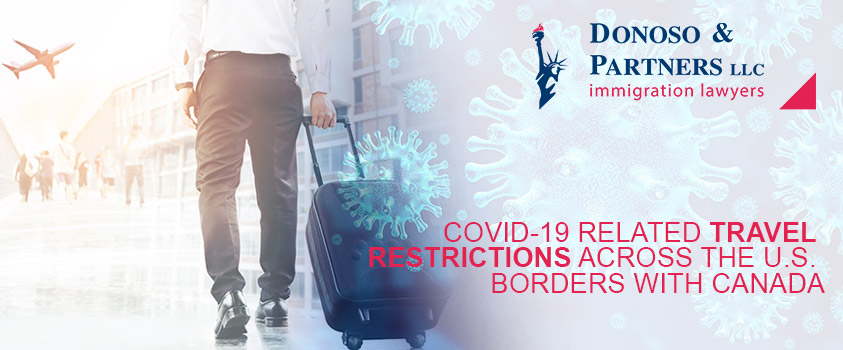Borders with Canada
-
-
- On April 20, the United States and Canada announced a mutual agreement to extend restrictions on non-essential travel across our shared border for an additional 30 days.
- “Non-essential” travel includes travel that is considered tourism or recreational in nature. “Essential travel” still permitted includes: work and study, critical infrastructure support, economic services and supply chains, health, immediate medical care, and safety and security.
- Trade and business travel will continue to operate across our borders, ensuring workers and goods are not impeded.
- U.S. citizens, lawful permanent residents, and individuals with valid travel documents will be exempted.
- Land borders are operating at reduced capacity and with limited hours.
- Visit CBP and CBSA for details on land border crossings.
- In addition to restrictions on non-essential travel between the United States and Canada, a number of provinces and territories have put in place specific restrictions for travel across their borders, including for domestic travelers. Please see our Message to U.S. Citizens on Domestic Travel Restrictions within Canada for more information.
-
The following categories do not fall within the definition of “essential travel:”
-
-
- Individuals traveling for tourism purposes, such as sightseeing, recreation, gambling, or attending cultural events in the United States.
-
Who is considered an “essential” traveler?
-
-
- Citizens and lawful permanent residents returning to the United States.
- Individuals traveling for medical purposes (e.g., to receive medical treatment in the United States).
- Individuals traveling to attend educational institutions.
- Individuals traveling to work in the United States (e.g., individuals working in the agriculture industry who must travel between the United States and Canada or Mexico in furtherance of such work).
- Individuals traveling for emergency response and public health purposes (e.g., government officials or emergency responders entering the United States to support federal, state, local, tribal, or territorial government efforts to respond to COVID-19 or other emergencies).
- Individuals engaged in lawful cross-border trade (e.g., truck drivers supporting the movement of cargo between the United States and Canada and Mexico).
- Individuals engaged in official government travel or diplomatic travel.
- Individuals engaged in military-related travel or operations.
-
Donoso & Partners, a leading immigration law firm based in Washington, D.C., will continue to report on developments regarding the immigration law and policy through our news section of donosolaw.com.
SCHEDULE A CONSULTATION TODAY.
Donoso & Partners, LLC provide assistance with review and advice regarding eligibility for visas to the U.S. or Canada.
